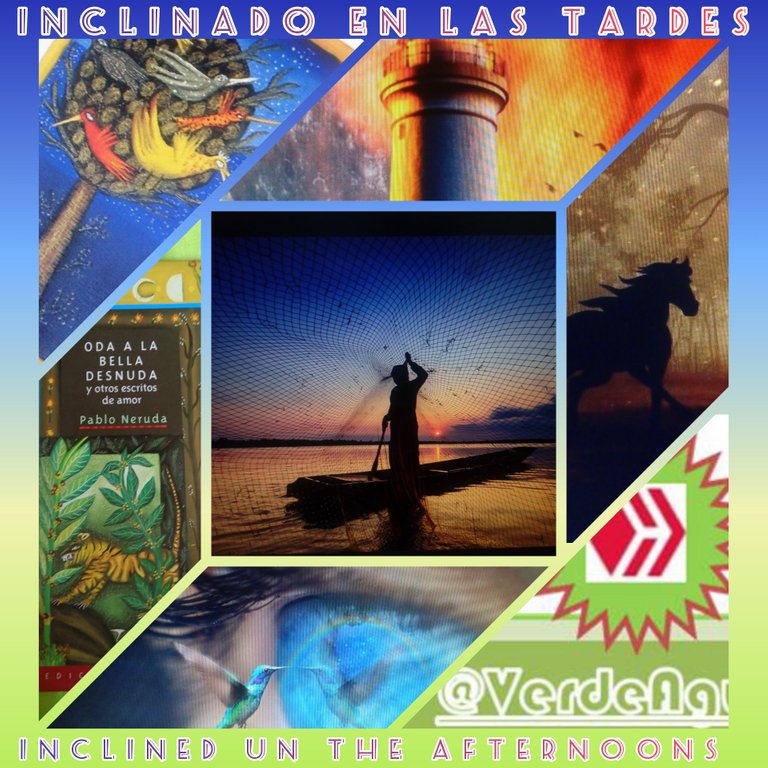
¡Saludo para todos en Hive¡ Hoy martes @ VerdeAgua persevera con cariño con los versos del poemario “Oda a la bella desnuda” de Pablo Neruda en este día, nos corresponde el poema: “INCLINADO EN LAS TARDES” tomando en cuenta los elementos visuales, auditivo y de naturaleza presentes en el poema, desde la visión de quien siempre está aprendiendo

Este hermoso poema posee 7 estrofas pareadas y discontinuados en cuanto a su medida, el poeta expresa cansancio y soledad en sus dos primeras estrofas. Las cuales, se reafirman al lanzar sus redes como pescador para pescar “o” recatar, lo que quizás no se puede. Es interesante, observar la personificación como elemento y evidenciado en las palabras: “tiro mis tristes redes” reflejando para mí su propio estado anímico, sin embargo,a pesar de sentirse triste y cansado, desea saber sobre ella. Esto se aprecia como elemento metafórico al apuntar: “a tus ojos oceánicos” haciendo hincapié en inmensidad “o” misterio de la presa (la amada) a quien él tiende la red.
Siguiendo con el compartir de poemas en el ciclo de: “Oda a la bella desnuda. Tenemos el poema:
a tus ojos oceánicos.
Allí se estira y arde en la más alta hoguera
mi soledad que da vuelta los brazos como un náufrago.
Hago rojas señales sobre tus ojos ausentes que olean como el mar a la orilla de un faro.
Sólo guardas tinieblas, hembra distante y mía, de tu mirada emerge a veces la costa del espanto.
Inclinado en las tardes tiro mis tristes redes a ese mar que sacude tus ojos oceánicos.
Los pájaros nocturnos picotean las primeras estrellas
que centellean como mi alma cuando te amo.
Galopa la noche en su yegua sombría desparramando espigas azules sobre el campo.
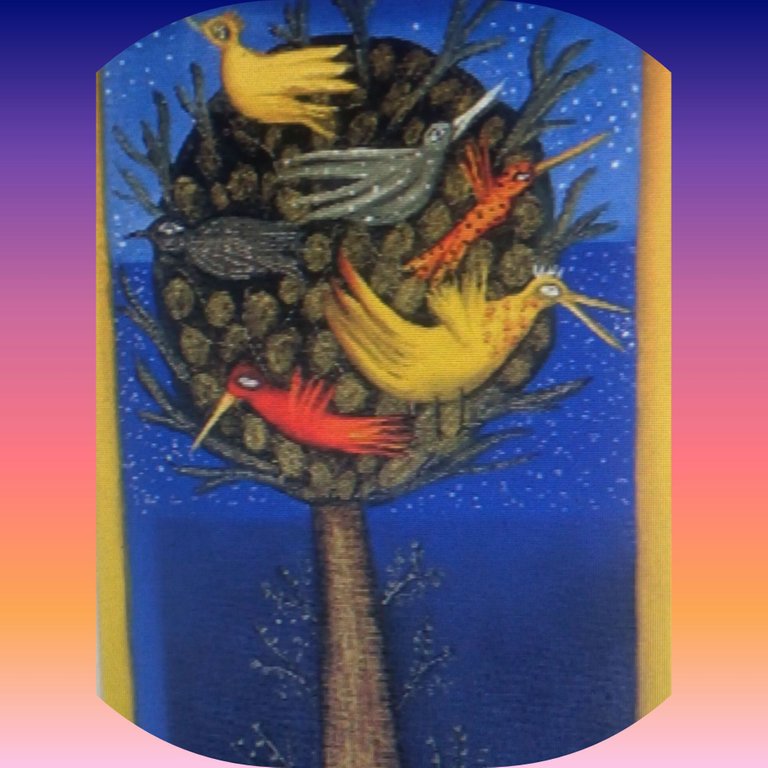
Realmente es admirable como en la primera y en la segunda estrofa se vislumbra su estética visual con expresar libre pero de delicadeza creadora de soledad, enmarcada en las palabras: hoguera, brazos, náufrago y soledad. Por su puesto, esta última palabra “soledad” envuelve todo el poema, además de recurrir a la estética Nerudiana (en esto coincido con los estudiosos que identifican el recurso de la naturaleza en sus poemas, es decir su sello como poeta) en estas estrofas de imágenes referidas al océano,redes y náufrago.
En cuanto a la tercera y cuarta estrofas encuentro la secuencia del sujeto lírico, es decir, la continuidad creadora de los versos pero con elementos nuevos como; rojas señales, ojos ausentes, Orillas de un faro, guardas tinieblas, hembra distante, costa del espanto distante lo que me manifiesta la oposición de la amada hacia él (enamorado). Sin embargo, persiste la insistencia del individuo lírico de una manera implacable, en especial cuando le escribe: “hembra distante mía”, no obstante, aquí surge otro sentimiento que conozco muy bien personalmente. Ese sentir desesperanzado de su amor, sobre todo, al percibir en su mirada la respuesta que no desea; por ello, culmina empleando la palabra espanto paseándose en esta última líneas del poema, en la apelación visual una vez más, donde el encubre para sí el rechazo de la amada.
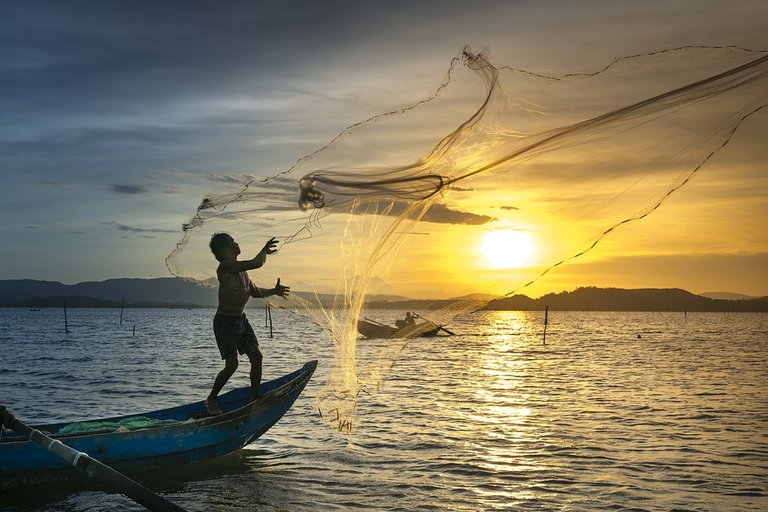
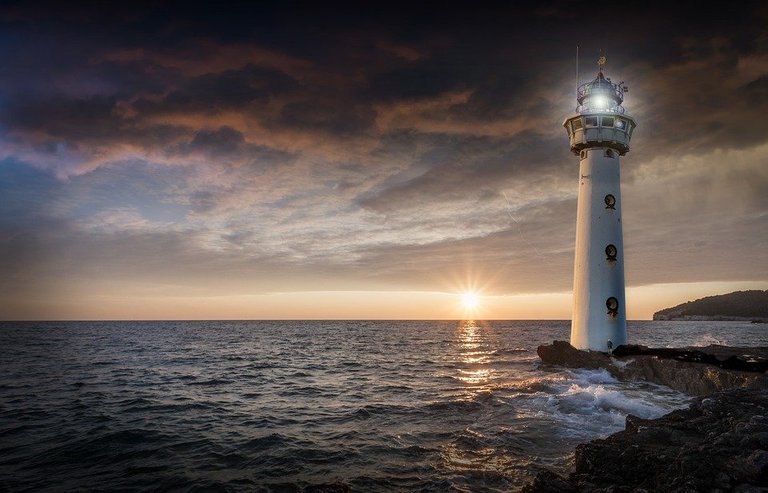
Seguimos con la quinta, sexta estrofas, y séptima estrofa. Se nota al individuo lírico cansando para seguir con la red lanzada, y me gusta la forma en que sigue con el hilo del recurso visual océano, pero le agrega una diferencia como una limitación a esa inmensidad al usar la palabra mar añadiendo de manera hermosa las palabras; pájaros, estrellas, alma, galopa, sombría, desparramando, espigas, y campo. En ese ofrecer de belleza presente en la naturaleza, y nos vuelve a ofrecer de manera magnifica el elemento visual con lo marítimo, hasta concluir con lo bello e iluminador de la misma naturaleza en la noche, incorporando para ello el elemento auditivo cuando menciona las palabras: “picotean y galope” pero en la palabra desparrama para mí es la cúspide para finalizar el verso del poema con el elemento visual.
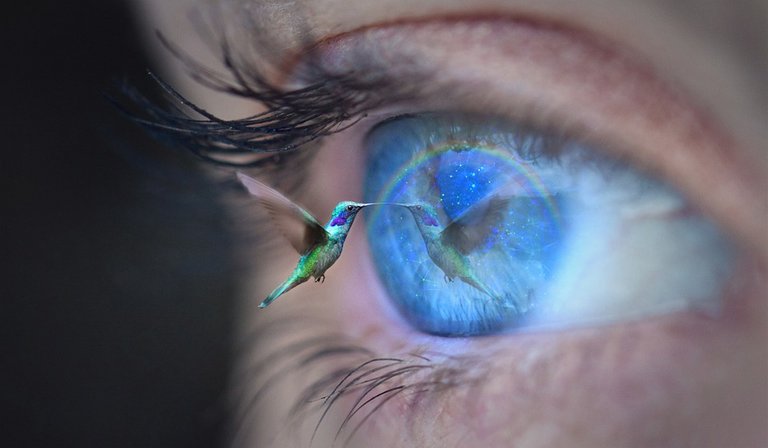

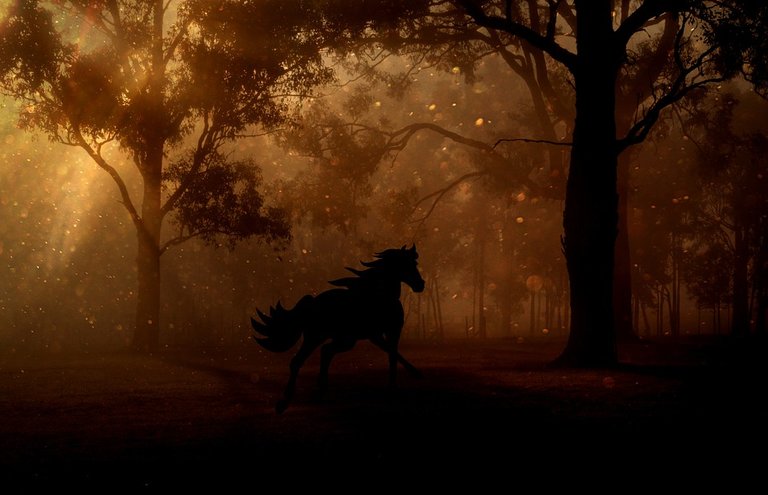

Requiero decir, que este poema habla de amor invisible, no correspondido, pero con una riqueza en ese intentar de conexión con la amada que me cautiva en los distintos momentos visuales y auditivos como; al inclinarse, tirar la red, sostener la red (pero no con la misma fuerza por su tristeza y cansancio) y el expresar su amor con un sentir profundo de soledad, pero con la fuerza de la luz de las estrellas hasta sentir en la amada lo sombrío que desgarra su alma, por el amor no correspondido. Me encanta el recurso usado de la noche para expresar tantas emociones, y lo atormentado por la pérdida para caducar observando cómo se aleja el amor. ¡Hermoso y cautivador poema desde el inicio hasta su final!
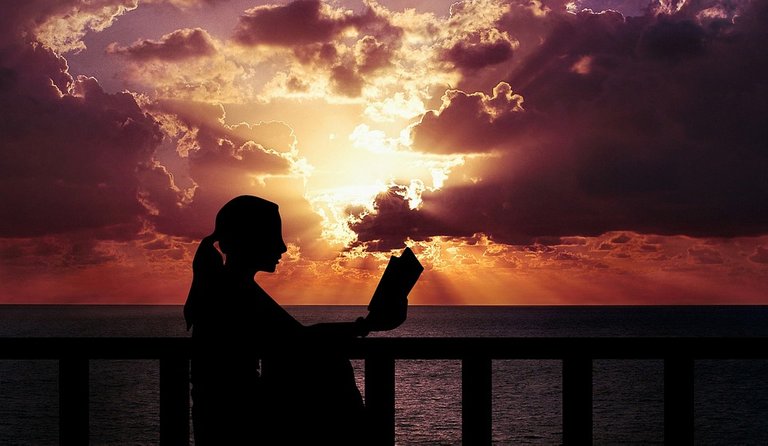
Les comparto como dato interesante que el verso presentado hoy, forma parte del segundo libro publicado: “Veinte poemas de amor y una canción desesperada” (1924) siendo el número (7) siete de los poemas. El título en esta obra es: “inclinado las tardes tiro mis tristes redes” Quizás no se encuentre entre los cinco poemas más famosos de Neruda, pero si es bien reconocido en sus obras. Como se pudo observado yo mantuve el título de la obra: “Oda a la bella desnuda” y si queréis saber de otras interpretaciones, su métrica, figura literaria… de manera sencilla sugiero visitar este link:
Referencia
Para finalizar les agradezco por leer este post, en especial a todos los que me dejan mensajes y por supuesto a toda la comunidad. Por cierto, si conocen otros links que puedan compartir conmigo para recabar mejor información de primera mano, se los recompenso galopando más, y mejor para continuar con estos hermosos poemas. ¡Feliz día "o" noche para todos!

REFERENCIAS
La imagen de portada fue tomada por mí con un celular Lg G3 y editadas en Power Point e Inshot.
La barra de corazones fue creación propia, así como el logo que me identifica como VerdeAgua, para ello, use la herramienta de formas, que están presente en Power Point.

> Greetings to all in Hive! Today Tuesday @ VerdeAgua perseveres with love with the verses of the poem "Oda a la bella desnuda" by Pablo Neruda on this day, it corresponds to us the poem:**INCLINED IN THE AFTERNOONS** taking into account the visual, auditory and nature elements present in the poem, from the vision of one who is always learning.

This beautiful poem has 7 paired stanzas and discontinued in terms of its measure, the poet expresses tiredness and loneliness in his first two stanzas. Which are reaffirmed when he casts his nets as a fisherman who is to fish "or" rescuer, which perhaps can not. It is interesting to observe the personification as an element and evidenced in the words: "I cast my sad nets" reflecting for me his own state of mind, however, despite feeling sad and tired, he wants to know about her. This is appreciated as a metaphorical element when pointing: "to your oceanic eyes" emphasizing the immensity "or" mystery of the prey (the beloved) to whom he casts his net.

Continuing with the sharing of poems in the cycle of: "Ode to the Naked Beauty. We have the poem:
Inclined in the afternoons I throw my sad nets to your oceanic eyes.
There stretches and burns in the highest bonfire
my loneliness that turns its arms like a castaway.
I make red signs on your absent eyes that smell like the sea on the shore of a lighthouse.
You keep only darkness, distant female and mine,
from your gaze sometimes emerges the shore of horror.
Inclined in afternnons I throw my sad nets to that sea that shakes your oceanic eyes.
The night birds peck at the first stars.
stars that twinkle like my soul when I love you.
The night gallops on her shadowy mare scattering blue ears of corn over the field..

It is really admirable how in the first and in the second stanza we can glimpse his visual aesthetics with free expression but of creative delicacy of solitude, framed in the words: bonfire, arms, castaway and solitude. Of course, this last word "solitude" surrounds the whole poem, besides resorting to Nerudian aesthetics (in this I agree with the scholars who identify the use of nature in his poems, that is, his seal as a poet) in these stanzas of images referring to the ocean, nets and shipwrecked.
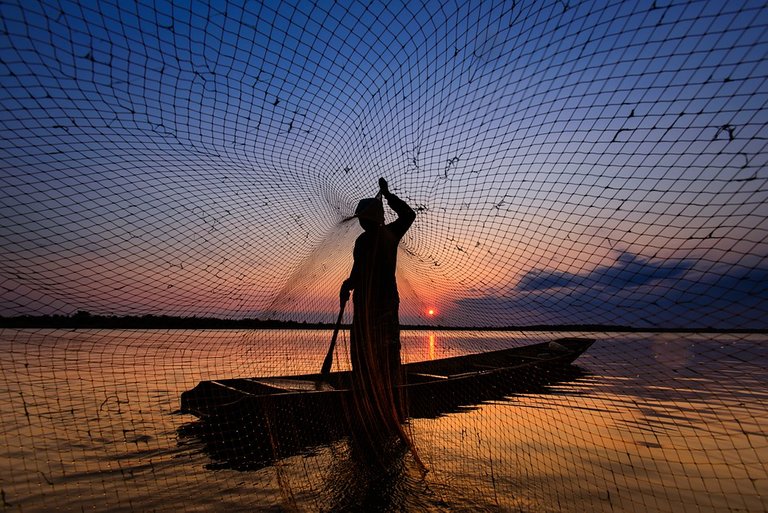

As for the third and fourth stanzas I find the sequence of the lyrical subject, that is to say, the creative continuity of the verses but with new elements such as red signs, absent eyes, rings of a lighthouse, shadows of darkness, distant females, coast of distant fright which shows me the opposition of the beloved to him (lover). However, the insistence of the lyric individual persists in a relentless way, especially when he writes to her: "distant female of mine", however, here another feeling arises that I know very well personally. That hopeless feeling of his love, above all, when he perceives in her look the answer he does not want; for this reason, he ends up using the word espanto walking in this last lines of the verse, in the visual appeal once again, where he conceals for himself the rejection of the beloved.


We continue with the fifth, sixth stanza, and seventh stanza. We notice the lyrical individual tiring to continue with the thrown net and I like the way he continues with the thread of the visual resource ocean, but he adds a difference as a limitation to that immensity by using the word sea adding in a beautiful way the words; birds, stars, soul, gallops, somber, scattering, spikes, and field. In that offer of beauty present in nature, and offers us again in a magnificent way the visual element with the maritime, to conclude with the beautiful and illuminating of the same nature of the night, incorporating for that the auditory element when he mentions the words: "picotean y galope" but in the word scatter for me is the pinnacle to finish the verse with the visual element.




I need to say, that this poem speaks of invisible love un requited, but with a richness in that attempt to connect with the beloved that captivates me in the different visual and auditory moments as when leaning, throwing the net, holding the net (but not with the same strength because of her sadness and tiredness) and expressing her love, with a deep feeling of loneliness, but with the strength of the light of the stars until feeling in the beloved the somberness that tears her soul, because of the unrequited love. I love the resource used of the night to express so many emotions, and the tormented by the loss to expire watching how love moves away. Beautiful and captivating poem from the beginning to the end!

I share with you as an interesting fact that the verse presented today is part of the second book published: "Twenty Love Poems and a Song of Despair" (1924) being the number (7) seven of the poems. The original title in this work is:Inclined in the afternoons I cast my sad nets* Perhaps it is not among Neruda's five most famous poems, but it is well recognized in his works. As it could be observed I kept the title of the work:"Ode to the beautiful naked" and if you want to know about other interpretations, its metric, literary figure... in a simple way I suggest to visit this link:
Reference
Finally I thank you for reading this post, especially to all those who leave me messages and of course to the whole community. By the way, if you know other links that you can share with me to gather better first hand information; I reward you galloping more and better to continue with these beautiful poems. Happy day or night to all!
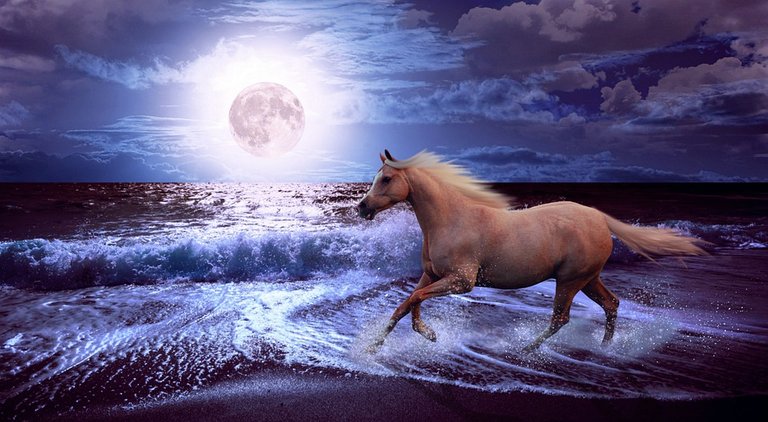

REFERENCES
The cover image was taken by me with a Lg G3 cell phone and edited in Power Point and Inshot.
The hearts bar was my own creation, as well as the logo that identifies me as VerdeAgua, for it, I used the shapes tool, which are present in Power Point.